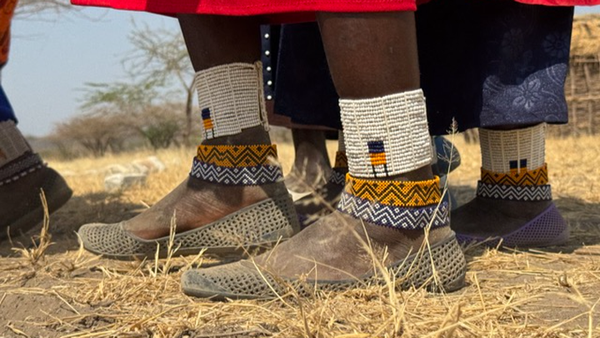Ramadan Reflections: Rejecting the ‘Good’ and ‘Bad’ Muslim Narratives, and Following My Own Path
How I practice my faith is no one else's decision but mine.

Access the Audio Read version of this article directly on Spotify for Podcasters.
Ramadan is here, and it's that time of the year when I feel better connected to who I am as a person and a Muslim woman - but also when additional scrutiny is on the Muslim community.
Every year, I make a mental checklist about what my intentions are about a week or two before Ramadan starts, as well as other to-dos. These include cleaning my flat from the top down to start my fast with a fresh mind and space, figuring out my workout plan for the month which has included daily yoga practice in the last few years, determining which charity I’m going to give to, and my eternal struggle: reading the Quran. This one is always a very difficult task for me, I painfully admit.
This year again, I will be fasting and doing my best to live this month in a way that aligns with my beliefs and values. While Ramadan has its set of challenges, it’s also the very moment I can get myself out of social commitments without too much explanation, which is always a win, especially for introverts like me. It makes it easier to manage my wellbeing - whether physical or mental - and my ‘me time’, and I better connect to the hardships of this world, for better or worse.
Having grown up in France until my late twenties and having lived in the UK for the past 11 years, there’s one thing I'm always reminded of, wherever I am, by the mainstream media and the government: I am a 'bad Muslim'. According to them, and this rings specifically true in France where racism and Islamophobia have turned into an Olympic sport, I'm a bad Muslim for not wearing a hijab or dressing modestly. I'm a bad Muslim for not having always eaten ‘halal' (but this is no longer a problem for me as I don’t eat meat anymore). I’m a bad Muslim for being a feminist. I'm a bad Muslim for being a Muslim. I'm a bad Muslim for existing.
That's probably why I've always lied low and not always been vocal about my faith. Growing up very shy, I’d always been worried about speaking up and what people thought of me, even though I was raised in an environment mostly surrounded by people of colour. A part of me always thought it was better to stay discreet, in a self-preservation effort. For a long time, I didn’t have to share that I was Muslim. It was almost immediately assumed while I was in school, but when I started university and the world around me turned ‘whiter’, I suddenly became ‘different’. I felt this urge to try to blend into this world so I wouldn’t be singled out. This reasoning hit even harder as I reached the workplace, where something as simple as wearing my naturally curly hair was always something I refrained from, for many years.
But the part I also had to admit to myself was that I’m not the most knowledgeable Muslim. Being Muslim has always been a given. I grew up in a Muslim family who never forced any practice on me, whether it was praying, learning the Quran, or any other pillar of Islam, but the foundations were always there: don’t eat pork, fast, be generous and charitable, and be a good person overall. It didn't really matter what else I included in this practice, as long as I was an okay version of a Muslim person. I say that as I recognise that I’m not an example of what a good Muslim should be, but also that I’m a better version of what I used to be.
I always had an open mind to faith. I don’t think one faith is better than the other or that some people are living theirs the wrong way. Who am I to judge when I have been trying to find my own place within my faith? Islam is reportedly the second-largest religious community globally, with around 1.8 billion followers. This is a mind-blowing number, yet, Islam is also somehow one of the most vilified religions in the world. Not a day goes by without me reading attacks on Islam in the news or social media, such as how Islam is a ‘threat’ to the world, with reasons ranging from women wearing hijab in public to terrorist attacks; and all of it, mostly branded under ‘islamophobia’.
According to the OSCE Office for Democratic Institutions and Human Rights (ODIHR), “Muslims are often portrayed as a monolithic group, whose culture is incompatible with human rights and democracy.” Society often positions us as an archaic and inflexible group that doesn’t believe in democracy, free will, and human rights. This reasoning is completely absurd and untrue. Why would the actions of a few represent the truth for all?
On the positive side, I’ve been very pleased to see the entertainment industry try to improve the representation of Muslim people and smash the dated and deeply ingrained stereotypes of ‘Good’ Muslims. Some projects have been a breath of fresh air for me, and their authentic (or different) representations of Muslims helped highlight the multiplicity of being Muslim. In particular, I loved ‘We Are Lady Parts’, a TV show about a Muslim girl Punk band tearing down the clichés around what it means to be a Muslim woman and a hijabi. ‘Ms Marvel’, the first female Muslim superhero of South Asian descent, also deserves an honourable mention. In ‘Ramy’, a young Muslim man struggles to find his place and delivers the beauty and flaws of being a Muslim in each episode. In ‘Mo’, which follows the life and adventures of Mo Amer, a Palestinian refugee living in Houston, Texas, the protagonist tries to break away from the system and live a better life.
And this list wouldn’t be complete without British actor and activist Riz Ahmed, and his work to improve the representation of the Muslim community in the TV industry. In 2021, he launched ‘The Blueprint for Muslim Inclusion’*, an initiative that offers funding and mentoring to Muslim storytellers in the early stages of their careers.
“The representation of Muslims on screen feeds the policies that get enacted, the people that get killed, the countries that get invaded,” shared Riz Ahmed on The Muslim Blueprint website. “The data doesn’t lie. This study shows us the scale of the problem in popular film, and its cost is measured in lost potential and lost lives.” A powerful statement to a cause that would shine a light on an extensive community that is somehow still mostly excluded from the global narrative (except for the ‘war on terror’).
Being a Muslim is already perceived as a big enough responsibility and statement today without having the minority - read here: racists and misogynists - telling us that we are stains on their ‘perfect landscape’. Being a Muslim, just like in any other faith, doesn’t and shouldn’t make us super-human. It makes us people with flaws, trying to figure out our place in this world and living in harmony with the people and cultures around us while aiming to leave this world in a slightly better place than when we came in. At least that’s how I see it, and I’ve come to decide that I won’t care about what people think anymore. Whether I’m a good or bad Muslim is no one’s decision on this earth. Islamophobia is only a myth that hides behind racism, deficient education, poor judgement, and bad reporting.
* The Blueprint for Muslim Inclusion is an initiative by Pillars Fund, Riz Ahmed and Left Handed Films, USC Annenberg Inclusion Initiative, and with support from the Ford Foundation.





